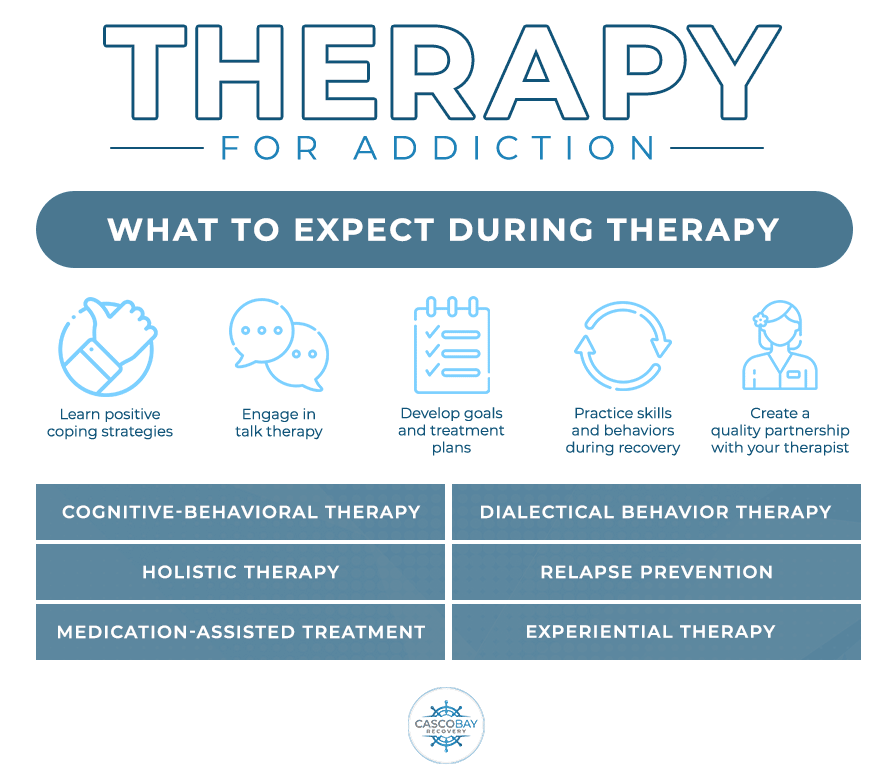 The need for substance abuse counseling in Maine is made clear by statistics on drug abuse in the state. Between 2019 and 2020, drug-related deaths increased by over 30%. With drug abuse and overdose on the rise, it is more important than ever to have access to quality addiction care. Casco Bay Recovery ensures you have access to modern, innovative, and effective therapies as a part of personalized addiction treatment plans.
The need for substance abuse counseling in Maine is made clear by statistics on drug abuse in the state. Between 2019 and 2020, drug-related deaths increased by over 30%. With drug abuse and overdose on the rise, it is more important than ever to have access to quality addiction care. Casco Bay Recovery ensures you have access to modern, innovative, and effective therapies as a part of personalized addiction treatment plans.
Addiction occurs over a long period of time, during which your brain and body learn new behaviors. Typically, the excessive release of “feel good” chemicals in the brain due to drug use leads to individuals returning to a substance again and again. As tolerance builds and brain chemistry is altered, stopping drug use can become an impossible task—especially when a withdrawal is involved.
As a complex disorder, there are many obstacles to overcome to rebuild a healthy level of brain function and to build better decision-making skills. Our addiction treatment center here at Casco Bay helps each of our members become their healthiest selves by providing a wide range of individual therapy options. If you are looking for substance abuse counseling in Maine, we can provide you with the care that ends the cycle of addiction and restores your emotional and psychological balance.
What Is Substance Abuse Counseling?
Substance abuse counseling is a fusion of different treatments and support that aids individuals with addiction recovery. This is true of substance abuse counseling in Maine and in other areas of the country. In fact, substance abuse counseling is a core element of any comprehensive addiction program. This is because it is designed to address the mental, physical, and relational aspects of addiction that can make recovery challenging.
During substance abuse counseling, patients work with a substance abuse counselor or a licensed addiction counselor. In each counseling session, you’ll learn about how addiction affects your brain. You’ll also learn to explore various topics and build skills you can use in real life to both avoid relapse and reclaim a life you love.
Additionally, you’ll be doing the following things in our substance abuse counseling sessions:
- Engaging in talk therapy, where you as the patient will explore your emotions and current life situations
- Exploring the cause of substance abuse and how it spiraled into addiction
- Learning positive coping strategies to replace harmful ones
- Working together to develop treatment goals and plans
- Practicing skills and behaviors necessary for addiction recovery
- Receiving recommendations for 12-step programs or groups
While the various therapies involved in substance abuse counseling are vastly different, each teaches the recipient a different tool, strategy, or way of thinking that you may find useful. Patients work with counselors who are licensed professionals in the fields of psychology, human behavior, chemical dependency, and therapeutic methods. With a wealth of knowledge, training, and clinical expertise, our substance abuse counselors work one-on-one with patients to work through the complexities of addiction.

Types of Addiction Therapy in Our Treatment Center in Maine
Within our therapy center, you’ll have access to a range of therapy types. While these therapies will differ in strategy, they all seek to achieve goals such as: diagnosing mental health disorders, meeting social needs, facilitating recovery and functionality, and addressing threats to sobriety. Some of these therapies include the following:
Cognitive-Behavioral Therapy (CBT)
Cognitive-behavioral therapy, also known as CBT, is a type of psychotherapy. This type of therapy explores the ways you can turn around the poor decision-making you engage in, like using drugs or alcohol by simply recognizing negative and inaccurate thought patterns. When participating in this therapy, you’ll learn how to control your thoughts and behaviors.
CBT is proven to help relieve the symptoms of a wide range of issues. These include various mental health disorders, eating disorders, phobias, and sexual disorders. During CBT sessions, patients learn about their specific condition and learn and practice techniques such as stress management, coping skills, and relaxation techniques.
First, you and your therapist will identify troubling situations or the existing conditions in your life that contribute to substance abuse. Next, the therapist will work with you to become aware of your specific thoughts, feelings, and emotions surrounding these problems. Once you share your thoughts, your therapist can help you identify unhelpful and negative thoughts, your patterns of thinking can be changed so that helpful patterns of thinking and resulting positive behavior patterns can become your new normal.
Dialectical Behavior Therapy (DBT)
Dialectical behavior therapy, or DBT, is another evidence-based therapy designed to teach you to master your thinking processes. Overall, it is about living in the moment and creating better decisions by fostering a healthy mindset. Moreover, this therapy is a type of CBT and therefore has many parallels with traditional CBT.
During DBT sessions, patients work with psychotherapists who aid with the development of emotional regulation and related skills. Emotional regulation often contribute to substance abuse and other harmful behaviors when individuals fail to cope with negative emotions in healthy ways. With DBT, patients gain hands-on support and strategies that aid with: core mindfulness, distress tolerance, interpersonal effectiveness, and emotional regulation.
Holistic Therapy
Holistic therapy focuses on addressing more than just the symptoms of a substance use disorder or mental illness. Many people need holistic therapy as a way to help them heal their bodies, minds, and spirits during addiction recovery. Because addiction influences so many aspects of your life, holistic therapy helps to encourage healing through programs like meditation and yoga.
Medication-Assisted Treatment
Many people facing addiction head-on recognize the risk of cravings and withdrawal symptoms. Cravings and withdrawal are usually the reason behind relapse. As an individual stops drinking alcohol or stops taking drugs, the brain and body experience unpleasant symptoms in response to the absence of substances the body has grown accustomed to.
Medication-assisted treatment, also known as MAT, is designed to provide FDA-approved medications to stop those unpleasant symptoms so you can be more successful in treating your addiction. For many in recovery, the medications used in MAT, when combined with substance abuse counseling and behavior therapies, help them focus on healing.
Other goals of medication-assisted treatment include:
- Decreasing the use of illicit drug use and other illegal activity
- Improving birth outcomes for pregnant people who engage in substance abuse
- Improving client survival rates by eliminating overdose risks
- Increasing patients’ ability to gain and maintain employment during or after treatment
- Increasing the rate of patient retention in treatment
Not every patient that needs substance abuse counseling in Maine will require MAT to get the most out of addiction treatment. While the treatment of certain conditions such as opioid use disorders and alcohol use disorders can benefit greatly from MAT, an evaluation with an addiction treatment specialist will determine if medication-assisted treatment is right for you.
Experiential Therapy
Another form of whole-body therapy, experiential therapy, is all about engaging in new experiences to help you build self-confidence and skills for daily life. You’ll find it can be enjoyable but also restorative to your mental health.
Relapse Prevention
Here at Casco Bay, we also offer relapse prevention. Everything you do during therapy will give you skills to avoid relapse. In relapse prevention treatment, you’ll develop strategies for managing stress, overcoming mental health breakdowns, and coming up with solutions for common addiction triggers.
EMDR: Eye Movement Desensitization and Reprocessing
EMDR is a psychotherapy that works to heal individuals from traumatic experiences. During this form of therapy, a therapist has a patient recall a traumatic experience and guides their eyes from side to side using a signal such as a light bar, auditory tone, or simply their finger. The eye movements that occur are similar to those that happen during REM sleep. This ultimately helps individuals reprocess trauma.
What Happens When You Reach Out for Substance Abuse Counseling in Maine?
When reaching out for substance abuse counseling in Maine, it can be easy to get overwhelmed by the various types of therapy available. That’s why it’s important to focus on what we can do for you at Casco Bay Recovery. Our team helps you to learn more about yourself and your needs.
When it comes to building a regiment of therapy and addiction treatment services, here at Casco Bay, you are never alone in that process. We offer treatment for the following type of substance addictions and more:
- Alcohol addiction
- Heroin addiction
- Benzodiazepine addiction
- Cocaine addiction
- Opioid addiction
- Meth addiction
- Prescription medication addiction
After initially assessing our patients, we here at Casco Bay work to create individualized treatment plans These individualized treatment plans may include aspects of individual and group therapy. If you are married, have children, or live at home with your parents, you may also benefit from family therapy.
Our programs here at Casco Bay Recovery are meant to support your long-term recovery. Here are some of the addiction treatment programs we offer that will start you on the right path to recovery:
- Partial Hospitalization Program (PHP)
- Intensive Outpatient Program (IOP)
- Outpatient Treatment Program (OP)
- Day Treatment Program
- Medication-assisted treatment
- Aftercare Program
- Men’s Rehabilitation Program
- Women’s Rehabilitation Program
- Young Adult Rehabilitation Program
These programs differ in the amount of time spent on treatment or in approach. Yet, they are all composed of substance abuse counseling and other treatment modalities. Additionally, we offer dual diagnosis treatment for individuals who are suffering from a substance use disorder and a mental illness. Whether that mental illness is depression, anxiety, post-traumatic stress disorder (PTSD), or general trauma.

Call Casco Bay Recovery Today For Addiction Therapy
As the premier addiction therapy center in Portland, Maine, Casco Bay Recovery offers the resources and therapies you need to overcome addiction and live your best life. You will learn, grow, and build a stronger future when you reach out to our team.
Explore the many addiction treatment opportunities that we offer. To get started with substance abuse counseling in Maine, contact us today.
References:
https://mainedrugdata.org/maine-drug-death-report-for-2020/
https://www.mayoclinic.org/tests-procedures/cognitive-behavioral-therapy/about/pac-20384610

